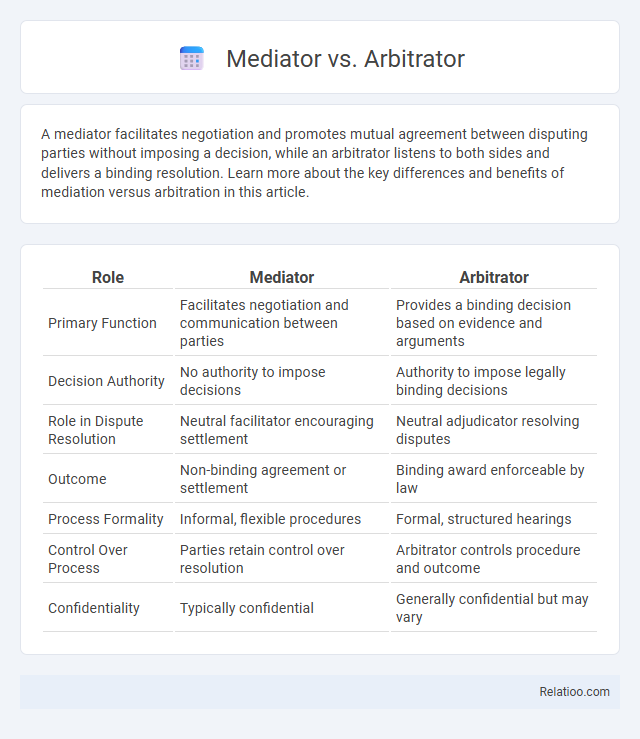A mediator facilitates negotiation and promotes mutual agreement between disputing parties without imposing a decision, while an arbitrator listens to both sides and delivers a binding resolution. Learn more about the key differences and benefits of mediation versus arbitration in this article.
Table of Comparison
| Role | Mediator | Arbitrator |
|---|---|---|
| Primary Function | Facilitates negotiation and communication between parties | Provides a binding decision based on evidence and arguments |
| Decision Authority | No authority to impose decisions | Authority to impose legally binding decisions |
| Role in Dispute Resolution | Neutral facilitator encouraging settlement | Neutral adjudicator resolving disputes |
| Outcome | Non-binding agreement or settlement | Binding award enforceable by law |
| Process Formality | Informal, flexible procedures | Formal, structured hearings |
| Control Over Process | Parties retain control over resolution | Arbitrator controls procedure and outcome |
| Confidentiality | Typically confidential | Generally confidential but may vary |
Introduction to Mediation and Arbitration
Mediation is a voluntary, confidential process where a neutral third party, the mediator, facilitates negotiation between disputing parties to help them reach a mutually acceptable agreement. Arbitration involves a neutral arbitrator who listens to both sides and makes a binding decision, similar to a private judge, making it more formal and structured than mediation. Both mediation and arbitration serve as alternatives to litigation, offering faster, cost-effective dispute resolution methods in commercial, labor, and legal conflicts.
Defining the Role of a Mediator
A mediator facilitates communication between disputing parties to help them reach a mutually acceptable agreement without imposing a decision. Unlike arbitrators, who act as neutral third parties with authority to make binding rulings, mediators guide the negotiation process and encourage collaborative problem-solving. Understanding your mediator's role is crucial in leveraging their skills to achieve a resolution tailored to your specific needs.
Understanding the Arbitrator’s Function
The arbitrator serves as an impartial decision-maker who evaluates evidence and arguments presented by disputing parties to deliver a binding resolution. Unlike mediators, who facilitate negotiation without imposing outcomes, arbitrators possess the authority to issue enforceable awards based on legal or contractual frameworks. Their role is crucial in resolving conflicts efficiently where parties seek a definitive judgment outside traditional court proceedings.
Key Differences Between Mediators and Arbitrators
Mediators facilitate open dialogue between disputing parties to help reach a mutually acceptable agreement without imposing a decision, while arbitrators act as private judges who review evidence and render a binding verdict. Unlike arbitrators, mediators do not have the authority to enforce decisions, allowing your parties greater control over the outcome. The key difference lies in mediation's collaborative, non-binding process versus arbitration's formal, adjudicative, and enforceable resolution.
Decision-Making Authority: Mediator vs Arbitrator
Mediators facilitate communication between disputing parties but do not have decision-making authority, allowing you to retain control over the final resolution. Arbitrators, however, act as private judges with the power to impose binding decisions based on evidence and arguments presented. Understanding this key distinction helps you choose the appropriate process depending on whether you prefer a collaborative solution or a decisive outcome.
Confidentiality in Mediation and Arbitration
Confidentiality in mediation is a fundamental principle that protects all communications and settlements from disclosure, fostering open dialogue between parties. Arbitration confidentiality varies by jurisdiction and arbitration rules but generally offers greater privacy than court proceedings, while arbitration decisions may be subject to limited exceptions for disclosure. Mediator confidentiality is typically absolute, ensuring that statements or concessions made during the process cannot be used as evidence in any future litigation.
Situational Suitability: When to Choose Mediation or Arbitration
Mediation suits situations where preserving relationships and achieving flexible, mutually agreeable solutions are priorities, especially in disputes requiring confidentiality and collaboration. Arbitration is better suited for cases needing a binding decision, often involving complex legal or technical issues where expediency and finality are essential. Your choice depends on the dispute's nature, desired outcome, and the importance of maintaining control over the resolution process.
Legal Implications and Enforceability
In legal disputes, a mediator facilitates negotiation between parties without imposing a binding decision, so agreements reached require separate enforcement mechanisms such as court approval. An arbitrator acts as a private judge whose decision, or award, is legally binding and enforceable in courts under the Federal Arbitration Act or equivalent state laws. Compared to mediation and arbitration, litigation results in court judgments enforceable by law but often entails higher costs and longer timelines.
Cost and Time Considerations
Mediator services typically incur lower costs and require less time compared to arbitration, as mediation involves facilitated negotiation without binding decisions, allowing quicker resolutions. Arbitration often demands higher fees due to procedural rules and the involvement of a neutral arbitrator whose decision is binding, potentially extending timelines. Litigation remains the most expensive and time-consuming option, with court procedures, discovery, and appeals increasing both cost and duration significantly.
Choosing the Right Approach for Dispute Resolution
Choosing the right approach for dispute resolution depends on the nature of your conflict, the desired level of formality, and control over the outcome. Mediators facilitate open communication and help parties find mutually agreeable solutions without imposing decisions, ideal for preserving relationships. Arbitrators, in contrast, act as private judges who deliver binding decisions, suitable for cases requiring finality and less cooperation.

Infographic: Mediator vs Arbitrator
 relatioo.com
relatioo.com